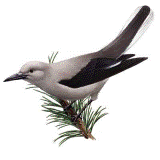Papers in the Biological Sciences
Document Type
Article
Date of this Version
1996
Abstract
Birds have been studied for centuries because they are numerous, conspicuous, and aesthetically pleasing to humans. Despite their overall regard for birds, historically, many ornithologists have considered birds as instinct-driven organisms of little intellectual capacity. For example, the ornithological textbook of choice from the 1960s states the following view of avian intelligence:
Flight has proven to be an enormously successful evolutionary venture, but one that has cost birds dearly in mental development. In effect, problems merely by flying away from them. … As a consequence, much [avian] behavior is, by mammalian standards, fragmentary, stereotyped, and at times amazingly stupid. (Welty, 1962, p. 159).
Research over the past 30 years has shown that this view of birds is incorrect. Field studies have demonstrated that birds possess considerable behavioral adaptability, often engaging in flexible and opportunistic behaviors while foraging, communicating, selecting mates, interacting in social groups, and avoiding predators (see Krebs and Davies, 1984). Laboratory studies have demonstrated that birds perform very well in solving a variety of complex cognitive problems (e.g., Pepperberg, 1990; Vaughan, 1988; Herrnstein, 1985; Kamil et al., 1977). Interestingly, the ability to solve many of these complex problems was once thought to be the exclusive province of primates. As Marler has suggested (this volume), the intellectual abilities of birds in some areas may be broadly equivalent or superior to that of mammals. Thus, understanding cognitive abilities of birds is an important issue for ornithologists. Most previous work on cognition in animals has been carried out by experimental psychologists who have not carefully considered either the ecological setting or evolutionary history of their subject species (see Kamil, 1988a). In this paper we present an explicit evolutionary approach to the study of cognition, with an emphasis on the use of comparative studies. Although this approach is quite general, it is particularly appropriate for ornithological studies.



Comments
Published in Current Ornithology, Volume 13, edited by V. Nolan Jr. and E. D. Ketterson. Plenum Press, New York, 1996, pp. 33–66. Copyright © 1996 Plenum Press, New York. Used by permission.